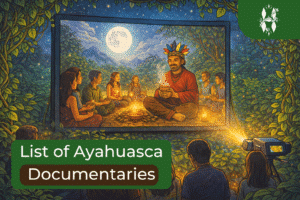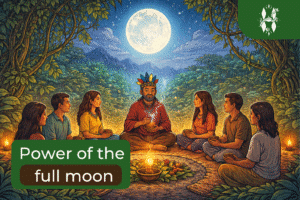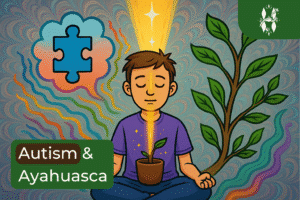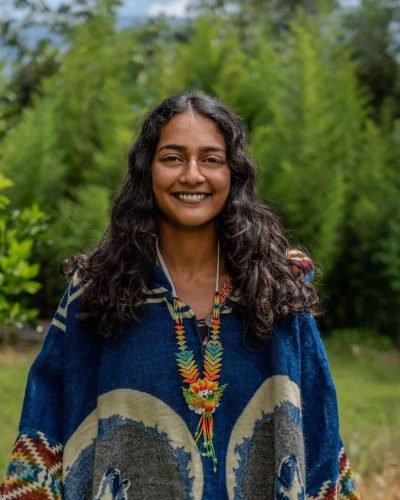For many, the intention with Ayahuasca is associated with healing, and the concept of forgiveness is frequently a part of this process. We often hold on to anger and grudges when someone caused us harm or injustice. This pain plants seeds of suffering within us, growing into of resentment.
Perhaps you were on the other side and started the cycle of pain, causing hurt to someone you hold dear, and therefore carrying a heavy burden of self-resentment. This burden may have even escalated into self-loathing, so the feeling of self-love is unfortunately just a concept and the opposite of reality.
The beauty of Ayahuasca is its ability to guide us beyond intellectual understanding to a more profound emotional truth. It’s one thing to mentally acknowledge forgiveness, quite another to genuinely feel it radiate from the core of your being. Such emotional shifts are complex and often take a significant amount of time. Yet, Ayahuasca can serve as a catalyst, dramatically accelerating this healing process.
Still, all of this won’t just happen if you “just” drink Ayahuasca. It is a tool that facilitates and speeds up the healing, but the responsibility of taking the necessary steps rests with us. You have to work with it. This article aims to showcase those steps, guiding you on your journey towards forgiveness through Ayahuasca and healing.
Key takeaways:
- Ayahuasca can help with deep emotional processes like forgiveness. When not addressed these topics can deeply impact and limit us in our lives.
- You will have to go through the different stages of forgiveness, acknowledging the pain it is causing, stopping the blame game, stopping to wishing the past was different, accepting the reality of life, embracing compassion and eventually forgiveness and even gratitude will come for the positive things that came out of the event.
- Forgiveness is an internal process but it is also important to put the effort in the outer reality, for example to start having the difficult conversations.
Table of Contents
Forgiveness through Ayahuasca: Facing an unprocessed event
The first step towards healing, which you may have already taken, is the facing and acknoledgenment of the occured event. Some individuals manage to distance themselves from a traumatic event so effectively that they feign ignorance of its occurrence. Or they dismiss its influence on their lives. This evasion, of course, is a far from the truth. However, this kind of self-deception might appear as the easiest course of action to navigate the overwhelming emotions at that moment.
But eventually, if you genuinely aspire to heal, you must acknowledge the event’s existence and its impact on your life. This acknowledgment may even emerge during an Ayahuasca ceremony. You might have considered something as just a minor occurrence, but suddenly, in the ceremony, you understand the significant implications this “minor” event has had either on you or someone important in your life.
And so begins the path of forgiveness, of setting things right, of healing the wounds and “fixing” the broken pieces.
Must read Blog: Ayahuasca healing – healing vs. improvement
Stopping the Blame Game
In any dispute, each party carries a story, and to varying degrees, each narrative holds its legitimacy. Often, we resist acknowledging the other person’s perspective, easily discarding it without a fair consideration. But pause and ask yourself: Is your side of the story absolutely true? Could there be a side to the story you might be neglecting?
Always, two sides exist, and the truth often dances somewhere between them. Yes, you can stubbornly cling to your version, repeatedly painting the other party as a heartless fool and asking how they could have done such a thing. However, this approach will not lead you down the path to healing.
Alternatively, you can opt to view the situation through a variety of lenses, opening yourself to diverse perspectives. This shift can cultivate a deep sense of compassion towards the situation. The topic of compassion will be discussed in more depth later in the blog.
In an Ayahuasca ceremony, the plant medicine might present you with these different perspectives. Sometimes it does gently, other times, more forcefully. If Ayahuasca displays a challenging perspective, it’s essential not to resist. In doing so, you’re merely fighting against yourself, and the resistance will only intensify, complicating your ceremony. If you open yourself to what Ayahuasca intends to show you, you’ll experience a significant release, and the process of your ceremony will become smoother.
Recognizing the suffering caused
A significant catalyst for change is often pain. Pain creates a level of discomfort so acute that it creates the desire for transformation. Therefore, for you to initiate healing, you must first recognize how your circumstances contribute to suffering in your life.
There’s a saying: “Holding on to anger is like drinking poison and expecting the other person to die.” But the person truly suffering from this toxic situation is you. Ask yourself, for how much longer are you willing to suffer? When your answer becomes “no more,” you set in motion the wheels of change. It’s about acknowledging that you’re an active participant in your own suffering, that your state of mind – your thoughts and feelings – magnifying the suffering in your life.
Understand that you can alter your thoughts and emotions regarding an event. You can instigate a shift, however challenging it might seem from your current state of consciousness. Yet, within the realm of “extraordinary consciousness” as described by Ayahuasca shamans – a state induced through Ayahuasca – these seemingly impossible shifts can begin to occur.
Stop wishing to be able to change the past
In Islam, there’s a saying: “When things go wrong, one should never say, ‘If only I had done such and such, this would not have happened.’ ‘If only I had…’ provides an opening for the devil.” Please note, this isn’t about religious dogma. Instead, the essence of this proverb is what resonates deeply with me, and possibly, with you too.
Many of us can look back at certain chapters of our lives where we believe we messed up, and wish we would have acted differently (I certainly do). Sure, these past missteps serve as a valuable lessons to avoid repeating those mistakes. However, constant reminders over past errors and dwelling on them doesn’t contribute positively to your healing journey.
The Crucial Step of Acceptance
One huge step towards forgiveness is acceptance. When you embrace the reality of what has happened, accepting that you can’t alter the past, you’ve already crossed a significant threshold. A substantial portion of resentment stems from our resistance to reality, our reluctance to accept things as they are. However, when we surrender to the situation, it empowers us to channel our energy towards things we can genuinely transform.
For many, the concept of forgiveness through Ayahuasca might seem like a distant dream. However, one achievable and therapeutic shift in mindset is working towards acceptance. This doesn’t mean we’re erasing past events or negating their effects. Instead, it’s about acknowledging their existence without any desire to rewrite history. Acceptance allows us to look at the past with clear eyes and say, “Yes, this is what occurred. This is where I fell short. This is where someone else caused me pain.” It’s simply about recognizing that events have occurred without the need to add any additional layers or stories. Just pure, undiluted acceptance.
If you are ready to take the step towards acceptance with the help of Ayahuasca, you are more than welcome at our Center: Ayahuasca Retreat Guacamayo.
Embracing Compassion: Towards Others and, More Importantly, Towards Yourself
Compassion serves as a guiding light towards forgiveness. This profound sentiment reminds us that we are all imperfect beings navigating our unique journeys, shaped by our past experiences and circumstances. Much of the hurt we encounter is not rooted in malicious intent but in unconscious actions, propelled by patterns that were perhaps unknowingly inherited. These patterns, more often than not, contribute to their bearer’s suffering as well.
Understanding this complexity can alleviate a lot of resentment, making forgiveness a more attainable goal. Compassion allows us to see that, given the same circumstances and influences, we may have acted similarly to those we hold grudges against.
Compassion also helps us to be kinder to ourselves. It aids in acknowledging that our past selves acted to the best of their abilities given their understanding and circumstances at that moment. This realization that we weren’t acting to create suffering deliberately, but were instead caught in patterns can provide a level of comfort and forgiveness towards ourselves.
And Ayahuasca can be a potent ally in developing this compassionate perspective, facilitating our understanding of our own actions and those of others. This understanding brings us one step closer to forgiveness through Ayahuasca and healing.
Forgiveness naturally follows
There is an extraordinary liberation in forgiveness, like shedding a heavy weight that has burdened your shoulders for far too long. It allows you to break yourself away from the chains of resentment and free your heart from the past pain.
This liberating transformation tends to follow naturally once you’ve journeyed through the preceding steps of acceptance and compassion. The process of forgiving may not always be linear or swift, but when it does occur, it’s as if a deep exhalation has swept away years of stored anger and hurt.
So, if you find yourself in this place of true forgiveness, be it towards others or yourself, take a moment to celebrate this significant milestone. Congratulations! Now, allow for a more peaceful chapter in your life’s narrative.
Embracing Gratitude
The notion of gratitude might seem a far-off concept, especially when we’re still navigating the aftermath of a painful experience, and that’s completely understandable. Yet, incredibly, it’s this act of gratitude that often signifies the end of our journey to forgiveness through Ayahuasca and authentic healing.
In the grand scheme of life, it’s usually the most challenging situations that catalyze our greatest growth. Although it’s a bitter pill to swallow, our struggles often hold the greatest potential for personal evolution. You might not wish your trials upon anyone else, but with some perspective, you may begin to appreciate how these trials have shaped you, enriched your life in surprising ways, or made you more resilient.
Perhaps it’s not evident with the situation you’re currently dealing with, but it may become clear when reflecting on past difficulties that once brought you pain but subsequently made you stronger. And just as with those past experiences, your current challenges also hold the power to transform you, to propel you forward on your personal growth journey.
Often, our deepest wounds evolve into our greatest gifts. The lessons we truly absorb can be harnessed to guide others on similar paths, creating a sense of unity in shared human experiences.
However, remember, this is the final stage of the process; it’s crucial not to try to skip the preceding steps in a rush to find gratitude. Healing isn’t about skipping to the end; it’s about honouring each stage, each piece of the puzzle. And when you do finally put that last piece into place, the picture of your life will undoubtedly appear brighter, more harmonious, and with a deeper sense of purpose.
Avoiding the Trap of Old Victim Patterns
At times, even after having successfully navigated through all stages of the healing journey, we may find ourselves tempted to revisit the scene of our wounds. This happens because our psyche can become oddly attached to our suffering, instinctively seeking to reopen healing wounds and pile on another layer of narrative to the original event. You may find yourself fixating on a new detail of the memory, replaying the narrative of victimhood. The other person becomes the villain again, life seems unjust, and you find yourself swept up in the currents of resentment and self-pity.
It’s important to recognize this pattern for what it is – a mental or egoic trick, an attempt to lure you back into old, victim mentality. Acknowledge that you are on the verge of falling back into this trap. Then, consciously decide whether you wish to descend into this familiar cycle, or if you’d rather step back, redirecting your focus onto something more productive or positive.
While it’s true that our life experiences shape us, after reaching a certain level of emotional maturity, we have the freedom to choose which thoughts and emotions we engage with. What kind of mental nourishment are you providing for your mind? Which emotions do you wish to foster and expand upon?
I urge you to select gratitude, love, and compassion. By making this choice, you’re not only creating a more peaceful internal landscape, but you’re also contributing to a more positive, more harmonious life experience overall.
Doing the work in our outer reality
The journey towards forgiveness isn’t solely an internal process; it often requires us to engage in challenging conversations as well. We must find the courage to offer apologies to those we’ve hurt and express forgiveness to those who’ve caused us pain. Ultimately, our goal is to build a better life, which might involve the other person in our future or might simply involve making peace with past conflicts. Regardless, it is essential to clear up any lingering discord to the best of our ability.
The process of creating a conducive environment for healing and forgiveness is intricate and nuanced. So much so, I’ll be dedicating a separate blog post to explore this topic in depth. However, one key takeaway to remember is that compassion plays a crucial role in this process. It’s equally important to understand that everyone is on their own timeline of healing. This may mean that the other person might not be ready for such a conversation, and we need to respect and accept that reality.
Take the step:
Wherever you are on your path of forgiveness, I encourage you to take the next step. You don’t need to forgive everybody in one night of Ayahuasca, but you can start to get the ball rolling. It is a really difficult journey, revisiting all of this, looking at the story with radical honesty and opening our heart again and feeling the pain associated to the event. Nobody said, that healing was easy. But it is liberating, it is the path. A path that I wish you all the best on.
FAQ:
That’s okay. No one can or should force you into forgiveness. It might be a distant notion right now, but you can start by acknowledging what has occurred. Begin with acceptance, stop attempting to alter the unchangeable. Consider that your present state may be causing more suffering than you realize, and that working towards resolution could enhance your physical, emotional, and spiritual well-being.
Yes, it’s possible. Ayahuasca ceremonies have the potential to facilitate significant internal shifts, including forgiveness. Part of Ayahuasca’s magic is its capacity to help us connect with our hearts, understand what truly matters, and purge what is distracting our path to a better life. However, it also depends on your willingness to go deep as well.
Forgiveness is a journey that involves multiple steps. These include recognizing unprocessed events, understanding the narratives and suffering involved, letting go of past mistakes, reaching a state of acceptance, cultivating compassion for yourself and others, forgiving, feeling gratitude, and avoiding falling back into old patterns. Ultimately, it may involve having necessary conversations with those involved.





